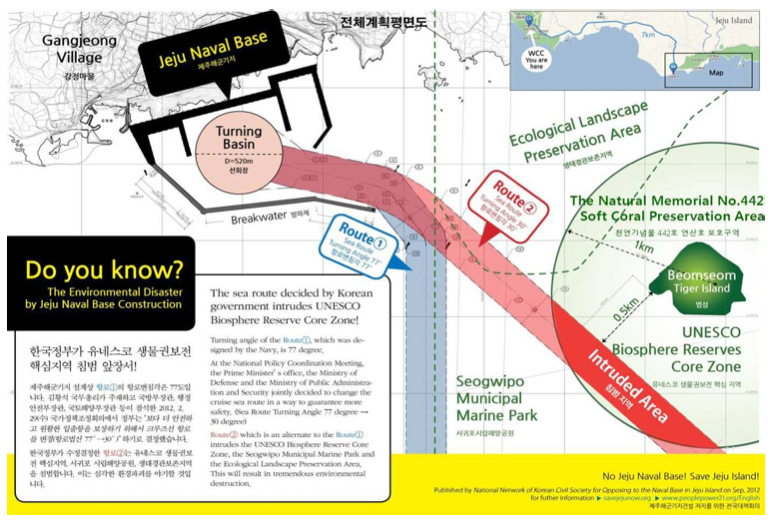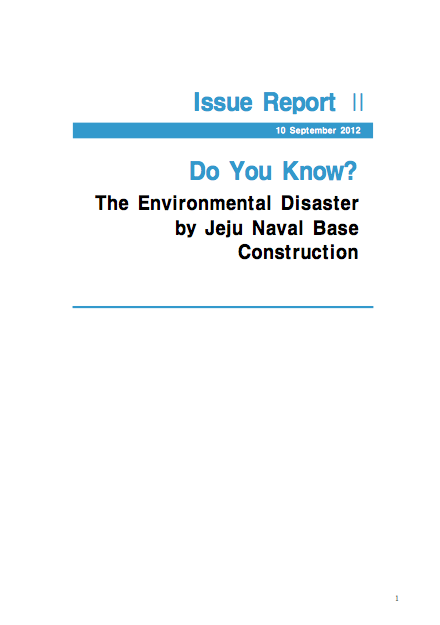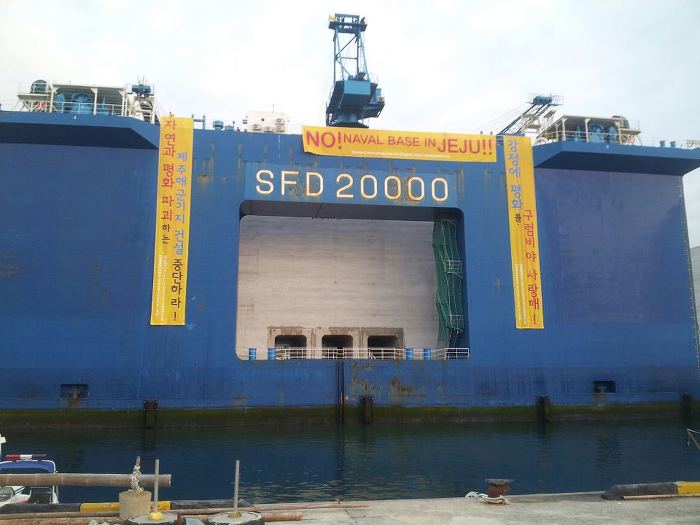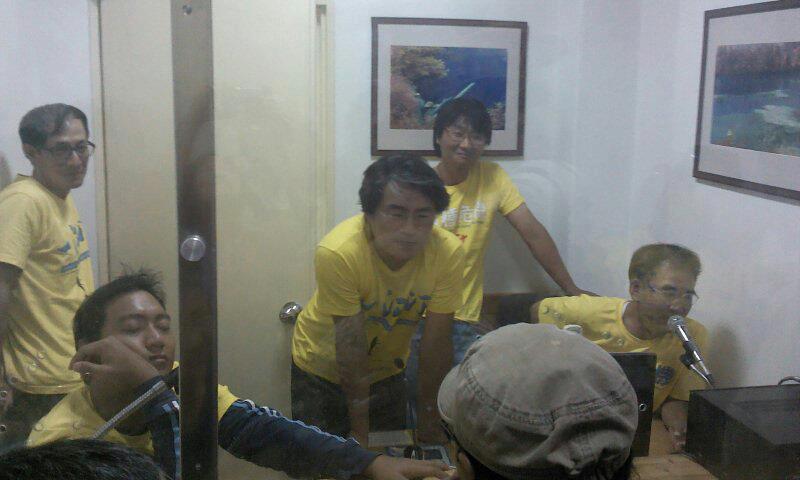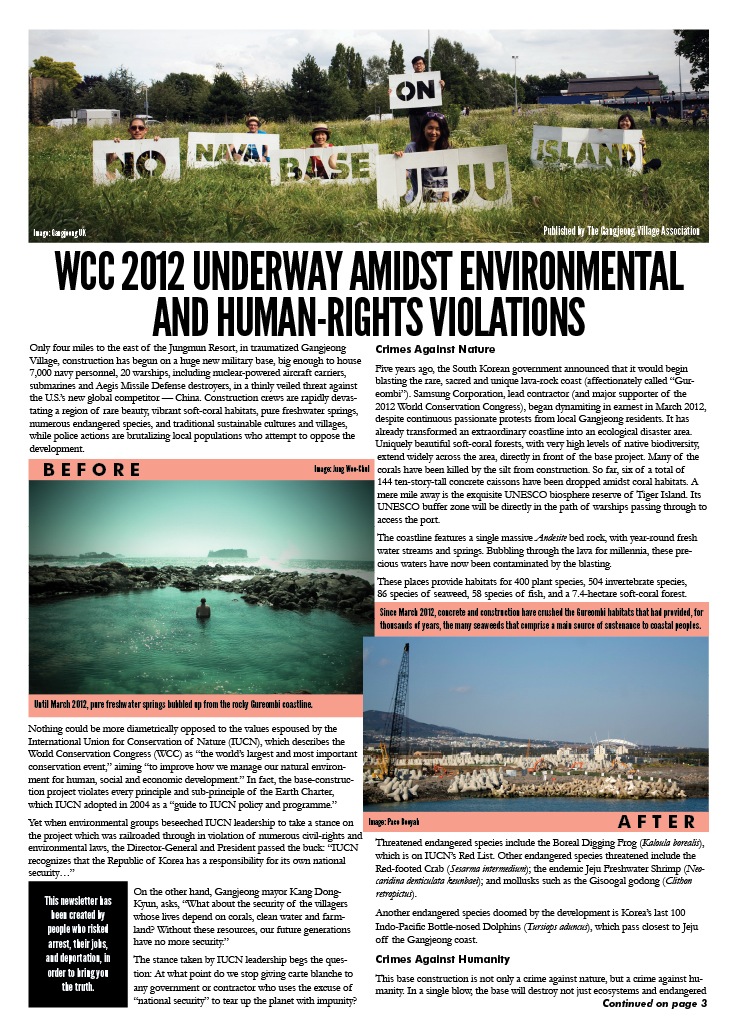The following statement is the 3rd open letter mailed to the leadership of the International Union for the Conservation of Nature. It was originally posted here.
TO: IUCN Leadership, Participants, and Global Environmental Organizations
FROM: Emergency Action Committee to Save Jeju Island
IUCN leadership still refuses to criticize Korea’s destructive naval base, though construction work is killing rare soft corals, numerous endangered species (including from IUCN’s Red List), and destroying indigenous communities and livelihoods. This stance from IUCN defies its traditional mission, conserving nature and a “just world.”
NEW RESOLUTIONS ARE NEEDED FOR EMERGENCY VOTE OF ALL IUCN MEMBERS
********************************
ABOUT A MONTH AGO, this committee was joined by dozens of co-signers from around the world, in circulating open letters to the leadership of the International Union for the Conservation of Nature (IUCN), and its associated members. The statements were remarking on recent actions of IUCN that directly conflict with its important historical mandates.
While continuing to proclaim its devotion to protecting Nature, including the planet’s endangered places and species, IUCN leadership has ignored or whitewashed projects that are assaulting these wonders, and undermining human rights and sustainable livelihoods. For example, the organization inexplicably planned its giant September convention only a few minutes’ bus ride from one of the world’s great current outrages—the construction of a large new naval base near the village of Gangjeong, on Jeju Island, the “jewel” of South Korea. The naval base project, meant to become home-port for Korean and U.S. missile-carrying warships 300 miles from China, is threatening one of the planet’s last great soft coral reefs, and other coastal treasures, killing numerous endangered species (including one on IUCN’s famous Red List), and destroying centuries-old sustainable communities of local farmers and fishers. The Gangjeong villagers have been protesting the base project for years, and are being met with daily police brutality. Such activities represent all that IUCN has traditionally opposed.
Then, a few days ago (August 22), an official letter arrived from IUCN leadership informing the indigenous villagers that their application to host a small Information Booth at the convention was denied, though dozens have been granted for corporations and other groups. No explanation was offered. (More details below.)
In our earlier communiques we referred to public statements from IUCN Director-General, Julia Marton-Lefevre, supporting the Korean government’s environmental policies, including its decisions vis-à-vis the military base and the infamous Four Rivers Project (also discussed below.)
Her praise encompassed the government’s seriously flawed “Environmental Impact Assessment” (EIA) for the base project. This, despite that the EIAignored three of the most critically endangered species at Gangjeong, the Red-footed Crab,Sesarma intermedium; the Jeju Freshwater ShrimpCaridina denticulata keunbaei), endemic to Jeju Island, and the Boreal Digging Frog pictured here (an IUCN Red-List species.) It also ignored effects upon Korea’s only pod of Indo-Pacific Bottle-nosed Dolphins which swim regularly through the area. Neither did it explore crucial impacts upon 40 species of soft coral, including nine that are seriously endangered, and five that are already protected by CITES (Convention on International Trade in Endangered Species of Wild Fauna and Flora). This activity takes place only 250 meters from a UNESCO Biosphere Reserve, Tiger Island.
(In an upcoming letter we will report on a far more authoritative environmental impact statement now being conducted, secretly, by a team of well-known, non-governmental volunteer scientists from several countries—some with prominent IUCN member organizations. They have already documented a spectacular enormous coral garden, 7.4 hectares large, within a mile of where the destruction is now advancing. The only other place in the world where there may exist a soft-coral forest of this magnitude is in the Red Sea. (The divers are operating secretly because the government deported several prior researchers.)
On a related matter, the Director General has praised the government’s “Four Rivers Restoration.” Alas, however, this is not “restoration.” As the Korean environmental community has made clear, it’s a re-routing of Korea’s four great wild, winding rivers into straight-line channels, partly encased in concrete, combined with extensive dam building, and dredging, to make them more business-friendly. The effects on riparian communities are devastating. In four years the population of Korea’s migratory birds, such as white-naped cranes, has been reduced by two-thirds and in many areas, the rivers have become algae-infested cesspools. At the recent Ramsar Convention in Bucharest (July, 2012), the World Wetlands Network announced a “Grey Globe Award” to the Four Rivers project, ranking it among the five worst wetlands projects in the world. The IUCN community should publicly denounce it, too.
Throughout the run-up to the Convention, neither Director-General Marton-Lefevre, nor President Ashok Khosla, has expressed any disapproval of the above ongoing assaults on Nature. Neither have they made mention of the police beatings and arrests of the indigenous protestors from Gangjeong village who are trying, every day, to protect Nature’s treasures from being destroyed—activities that the IUCN was actually created to protect.
90% AGREEMENT
The response to our earlier e-mailers was enormous, with at least 90% of respondents supporting our positions—including many from mid-level IUCN leadership. In a brief burst of democratic openness, the IUCN’s web-page reprinted our letters, while responding with generalities about its great concern for Nature, and democratic process, and it opened the page for public comments. But after the first 20 comments appeared, all of them critical of IUCN’s position, the responses were erased off the page. On the other hand, the Korean government’s manifesto on its dubious “green” development policies continues to be displayed. So much for democracy.
IUCN also announced that it will propose that attendees pass a proclamation (“Nature+”)concerning the glories of Nature, but which still does not mention what’s going on ten minutes away, and while also denying permission for the local community to formally state their views in the Congress meetings. Up to this moment, the leadership of IUCN continues to avoid any expression of concern or even awareness of the impacts on Nature and community, just down the street, though such concerns are central to the organization’s mandate.
Why is IUCN leadership remaining so silent? For the leadership, it may be more of a financial and political matter than one of conservation or social justice, which is what IUCN was supposed to be about. There is also an underlying reality: A large percentage of the cost of this WCC convention in Jeju is being covered by the very people building the military base. Those would be the Korean government, and several giant global corporations, notably Samsung.
Having accepted the funding, it is difficult to criticize the funders.
IUCN’s top leadership has apparently determined its best course now is to avert its gaze while the government kills the shrimps and the frogs, destroys the corals, and jails the protesting local farmers. Meanwhile, IUCN can freely proceed with its great meeting next door to save Nature.
But the organization has gone still further. IUCN has granted the Korean government (the “Korean Organizing Committee of the 2012 WCC,” the chair of which, is Lee Hongkoo, the former Prime Minister of Korea, a supporter of the base) approval-power over any South Korean organizations wanting to present alternative views. These include whether to grant permission to speak on the issues at the meeting, even when they are invited to do so by bona-fide IUCN member organizations, or merely to host an information table at the event. (See #2 below.) IUCN has also agreed to partner with its Korean financial sponsor in constructing and presenting the formal program of the Convention. So now, the government, eager to advertise its green initiatives, will be represented on every one of the five “prime-time” plenary panels of the convention, either by government or corporate officials. It is the only country in the world to be so privileged. None of those panels will focus on the Gangjeong military base construction, or the Four Rivers fiasco.
Finally, the questions become these: Whose IUCN is this? Does the complicity of IUCN leadership truly represent IUCN membership? Can anything useful still be achieved at the WCC in Jeju? On the latter point, we actually think YES, there still is. We call upon the IUCN participants to use the occasion to take stands on the following:
FOUR STEPS TO CHALLENGE MILITARY BASE DESTRUCTION & TO RE-ESTABLISH IUCN’S HISTORIC MISSION TO PROTECT NATURE AND HUMAN RIGHTS
#1. Assembly Resolutions: Shut the Base; Make a New EIA; Stop the Four Rivers Project.
Since our prior letters, our committee has become aware of the great work of several independent groups of environmental attorneys, representing IUCN-member organizations. They are working toward a series of Draft Resolutions to be presented at the WCC Assemblies, including all members. Among them are these:
Shut the Base. The first Resolution will demand that Korea end its military base construction, and that all ravaged lands be restored to their former condition. The Resolution will speak in behalf of the endangered species, the rare soft corals, the sacred sites, and the local villagers who are putting their lives on the line to protect these treasures.
The once-celebrated southern Jeju coastline is now being covered in concrete, thanks to the Korean government, Samsung corporation, and the silence of IUCN.
It will also describe the many IUCN rules and prior decisions that have been violated. These include, for example, the important principles of the Earth Charter passed by the 2004 Congress, as well as the UN Declaration on the Rights of Indigenous Peoples, the Convention on Biological Diversity, the World Heritage Convention, the UN Declaration on Human Rights, the International Covenant on Economic and Social Rights, among many others.
New Environmental Impact Assessment. A second Resolution may demand preparation and acceptance of a new Environmental Impact Assessment of the naval base construction near Gangjeong—free of government control and censorship—that will include a truly accurate assessment of the dredging and other impacts on the soft coral reefs, and the killing of rare species that are all absent from the government’s document. (As indicated above, a new independent EIA is already being prepared by several outraged IUCN scientists.)
End The Four Rivers Project. A third Resolution will demand that Korea immediately discontinue its notorious Four Rivers Restoration project, and begin to actually restore the great rivers to their prior condition.
There is one potential complication. Unsurprisingly, the attorneys were told by some IUCN management not to bother with these motions. They will be “too late,” past deadline, they were told. And yet, the historical record of IUCN offers many examples of last minute submissions. They have always been permitted if they raise new, urgent, unforeseen issues, and if at least ten IUCN members co-sponsor the request. There are already more than ten willing IUCN co-sponsors. And they certainly qualify as urgent new matters for IUCN. If we don’t stop this destruction now, by the time IUCN meets again in four years, the corals, the Boreal Digging Frogs and other species, and many local people will be dead. We must not let that happen.
#2. Let the Gangjeong People Speak.
Information Booth Crisis. As briefly mentioned above, the Gangjeong villagers, working to save habitats, biodiversity, and the Red-List species from the military’s destruction, applied a few months ago through official IUCN channels for permission to set up one “information booth” among the dozens of others that have been okayed within the convention center throughout the meeting. That would seem a benign enough request, but a runaround ensued. Instead of routinely okaying the application, the IUCN passed it to the Korean government (the KOC, mentioned above) which is heavily invested in silencing any and all opposition to the base or the Four Rivers project. Korean newspapers have also been silenced on these matters. Repeated efforts over recent weeks to confirm permission for the information table were ignored. Finally, a few days ago, they received an official letter from the Director of IUCN’s Constituency Support Group, Enrique Lahmann. He said this: “Unfortunately, we are not able to accommodate your request for an exhibition booth at the WCC.” That’s it. No reason was given. And no explanation of how this fullfills official IUCN proclamations of democracy and inclusiveness.
No Protest Allowed Within Two Kilometers. Meanwhile, the Korean government announced that it would not permit any demonstrations or even picketing within two kilometers of the Convention. So, no information table inside. No demonstrations outside. Where are we again? Isn’t South Korea supposed to be a democracy?
During the upcoming Assemblies, IUCN leaders must at last denounce the government for these appalling moves, and permit the villagers, who are actually doing IUCN’s work, to not only have their information table inside the convention, but if they so choose, to go ahead and demonstrate freely outside, just as if this were a democratic society.
Addressing the Full Assembly. All of the above is not enough. The Gangjeong community should be permitted —-no, invited by IUCN leadership—to address the opening and/or closing plenary of the IUCN convention, to provide the full story of this local disaster and what they are going through. If the government resists, the IUCN leadership should insist. We all need to hear from the indigenous local farmers and fisher-people, and the custodians of the sacred sites, about what they have seen and experienced. Everyone needs to hear this. After all, we are meeting on their indigenous soil, on their island, on the coast that has nurtured them for thousands of years. So, our own group inquired as to the possibility of the villagers speaking at the assembly, but we were told by IUCN officials, as above, that all South Korean presenters have to be approved by the government.
Here’s some good news. Several IUCN member groups have already (quietly) invited local leaders to participate in some of the groups’ own scheduled workshop panel time to tell the Gangjeong story. (In our next letter, we will brief you on who is speaking and at what time. By delaying this announcement, we hope to avoid government crackdowns against the groups.)
#3. Go Visit the Destruction Sites, and the Sacred Sites.
Members of our committee, and our Korean colleagues, will be arranging tours of Gangjeong village, the sacred sites that are threatened, and the front-lines of the ongoing confrontation between the villagers and the police at the construction site. It is horrifying and inspiring. (If you want to join those outings, please respond gangjeongintl@gmail.com.) It’s very easy to get there—ten minutes by local bus.
#4 Institutional Self-Examination.
Finally, we suggest that all IUCN members take this moment to assess what is happening in Jeju, and to initiate a process of institutional self-examination, questioning and re-organization. None of us can afford to lose the moral and ethical leadership of one of the world’s greatest organizations. We need to do whatever is necessary to assure that IUCN will revive its historical mandate to place Nature first, and to protect social justice.
Thank you for your attention.
Please let us know if you want to see the proposed resolutions; we will forward you the final texts when they are complete. We can also forward you the new independent Environmental Impact Assessment, when it is completed. And you can sign up for a visit and tour of Gangjeong Village and the military construction site. (OUR EMAIL ADDRESS IS BELOW.)
EMERGENCY ACTION TO SAVE JEJU ISLAND ORGANIZING COMMITTEE:
savejejunow@gmail.com
Christine Ahn
Global Fund for Women; Korea Policy Institute
Imok Cha, M.D.
SaveJejuNow.org
Jerry Mander
Foundation for Deep Ecology; International Forum on Globalization
Koohan Paik
Kauai Alliance for Peace and Social Justice
INTERNATIONAL SUPPORT GROUP:
Maude Barlow
Food and Water Watch, Council of Canadians (Canada)
John Cavanagh
Institute for Policy Studies (U.S.)
Vandana Shiva, Ph.D.
Navdanya Research Organization for Science, Technology and
Ecology (India)
Douglas Tompkins
Conservation Land Trust, Foundation for Deep Ecology (Chile)
Victoria Tauli-Corpuz
Tebtebba Indigenous Peoples’ International Centre for
Policy Research and Education (Philippines)
Anuradha Mittal
Oakland Institute (U.S.)
Meena Raman
Third World Network (Malaysia)
Walden Bello
Member, House of Representatives (Philippines)
Tewolde Berhan Gebre Egziabher
Environmental Protection Authority (Ethiopia)
Lagi Toribau
Greenpeace-East Asia
Mario Damato, Ph.D.
Greenpeace-East Asia
Debbie Barker
Center for Food Safety (U.S.)
Pierre Fidenci
Endangered Species International (U.S.)
John Knox
Earth Island Institute (U.S.)
David Phillips
Int’l Marine Mammal Project, Earth Island Institute (U.S.)
David Suzuki
The David Suzuki Foundation (Canada)
Robert Redford
Actor, founder of Sundance Institute (U.S.)
Mary Jo Rice
Int’l Marine Mammal Project, Earth Island Institute (U.S.)
Bill Twist
Pachamama Alliance (U.S.)
Jon Osorio, Ph.D.
Chair, Hawaiian Studies, Univ. of Hawaii (U.S.)
Sue Edwards
Institute for Sustainable Development (Ethiopia)
Galina Angarova
Pacific Environment (Russia)
Bruce Gagnon
Global Network Against
Weapons and Nuclear Power in Space (Int’l)
Andrew Kimbrell
Center for Food Safety (U.S.)
Jack Santa Barbara
Sustainable Scale Project (New Zealand)
Gloria Steinem
Author, Women’s Media Center (U.S.)
Medea Benjamin
Code Pink, Global Exchange (U.S.)
Randy Hayes
Foundation Earth (U.S.)
Noam Chomsky
Massachusetts Institute of Technology (U.S.)
Renie Wong
Hawaii Peace and Justice (Hawaii)
Kyle Kajihiro
Hawaiʻi Peace and Justice and DMZ-Hawaiʻi (Hawaii)
Terri Keko’olani
Hawai’i Peace and Justice and International Women’s Network Against
Militarism (Hawaii)
Wayne Tanaka
Marine Law Fellow, Dept. of Land & Natural Resources (U.S.)
(signing independently)
Tony Clarke
Polaris Institute (Canada)
Sara Larrain
Sustainable Chile Project (Chile)
John Feffer
Foreign Policy in Focus (U.S.)
Victor Menotti
International Forum on Globalization (U.S.)
Arnie Saiki
Moana Nui Action Alliance (U.S.)
Nikhil Aziz
Grassroots International (U.S.)
Lisa Linda Natividad
Guahan Coalition for Peace and Justice (Guam)
Rebecca Tarbotton
Rainforest Action Network (U.S.)
Kavita Ramdas
Visiting Scholar, Stanford U., Global Fund for Women (India)
Raj Patel
Institute for Food and Development Policy/Food First (U.S.)
Alexis Dudden
Author, Professor of History, Connecticut University (U.S.)
Timothy Mason
Pastor, Calvary by the Sea, Honolulu (U.S.)
Katherine Muzik, Ph.D.
Marine Biologist, Kulu Wai, Kauai (U.S.)
Claire Hope Cummings
Author, Environmental attorney (U.S.)
Ann Wright
U.S. Army Colonel, Ret., Former U.S. Diplomat (U.S.)
Buffy Sainte-Marie, Ph.D.
Educator, Singer-Songwriter (U.S.)
Yong Soon Min
Professor, University of California, Irvine (U.S.)
Eugeni Capella Roca
Grup d’Estudi I Protecció d’Ecosostemes de Catalunya (Spain)
Jonathan P. Terdiman, M.D.
University of California, San Francisco (U.S.)
Evelyn Arce
International Funders for Indigenous Peoples (U.S.)
Brihananna Morgan
The Borneo Project (Borneo)
Frank Magnota, Ph.D.
Physicist (U.S.)
Delia Menozzi, M.D.
Physician (Italy)
Aaron Berez, M.D.
Physician (U.S.)
Begoña Caparros
Foundation in Movement: Art for Social Change (Uganda)
Antonio Sanz
Photographer (Spain)
Cindy Wiesner
Grassroots Global Justice (U.S.)
Gregory Elich
Author, “Strange Liberators” (U.S.)
Joseph Gerson, Ph.D.
American Friends Service Committee (U.S.)
Piljoo Kim, Ph.D.
Agglobe Services International (U.S.)
Peter Rasmussen
He-Shan World Fund (U.S.)
Wei Zhang
He-Shan World Fund (U.S.)
Harold Sunoo
Sunoo Korea Peace Foundation (U.S.)
Soo Sun Choe
National Campaign to End the Korean War (U.S.)
Angie Zelter
Trident Ploughshares, (UK)
Ramsay Liem
Visiting Scholar, Center for Human Rights, Boston College (U.S.)
Kerry Kriger, PhD
Save The Frogs (U.S.)
Marianne Eguey
Jade Associates, (France)
Claire Greensfelder
INOCHI-Plutonium Free Future (U.S.-Japan)
Laura Frost, Ph.D.
The New School (U.S.)
Chris Bregler, Ph.D.
New York University (U.S.)
David Vine
Assistant Professor, American University (U.S.)
Simone Chun
Assistant Prof., Gov’t Department, Suffolk U., Boston (U.S.)
Matt Rothschild
Editor, The Progressive magazine (U.S.)
Henry Em
Professor, East Asian Studies, NYU (U.S.)
Eric Holt-Gimenez
Institute for Food and Development Policy (U.S.)
Maivan Clech Lam
Professor Emerita of Int’l Law, CUNY (U.S.)
Mari Matsuda
Professor of Law, Richardson Law School, Univ. of Hawaii (U.S.)
Beth Burrows
The Edmonds Institute (U.S.)
Aileen Mioko Smith
Green Action (Japan)
Susan George, Ph.D.
Transnational Institute (The Netherlands)
Marianne Manilov
The Engage Network (U.S.)
S. Faizi
Institute for Societal Advancement, Kerala (India)
Syed Ashraf ul Islam
Ministry of Food & Disaster Management (Bangladesh)
Manaparambi Koru Prasad
Kerala Local Self Government Department (India)
Hernán Torres, Director
Torres Asociados Ltda. (Chile)
Carlo Modonesi
Environmental Biologist, Parma University (Italy)
Andrej Kranjc
Secretary-General, Slovenian Academy of Sciences and Arts (Slovenia)
Ning Labbish Chao
Bio-Amazonia Conservation International (U.S.)
Perumal Vivekanandan
SEVA (India)
David Newsome
Environmental Science and Ecotourism, Murdoch University, Perth (Australia)
Korean Federation for Environmental Movement and Citizen Institute for Environmental Studies (South Korea)
